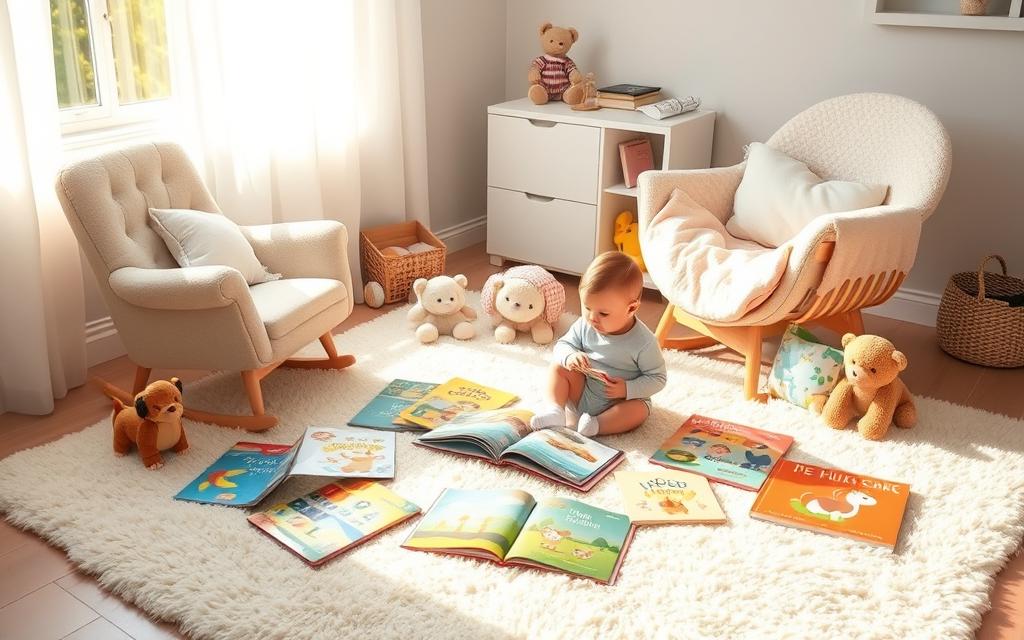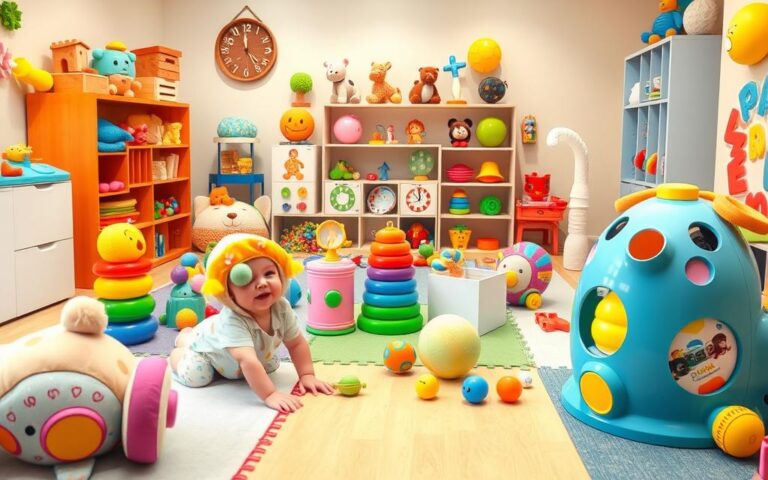Promoting Early Literacy in Babies: Tips for Parents

As a parent, you have a big role in helping your baby learn to read early. This is key for their brain, social, and emotional growth. Starting early sets the stage for success in school and a love for learning. By doing this, you help your child read, write, and talk well, which is very important.
It’s important to understand how early reading skills help your baby. It’s not just about teaching them to read. It’s about building a strong base for their future learning. With the right steps, you can help your baby develop skills that will last a lifetime. That’s why starting early is so critical.
By focusing on early reading skills, you give your baby a great start. This journey brings you and your child closer and is a smart investment for their future. With the right tips, you can make a big difference in your baby’s life. This article will give you the tools you need to support your baby’s early reading skills.
Introduction to Early Literacy
In this article, we’ll dive into early reading skills and share tips to help you. We’ll talk about creating a rich language environment and making reading fun. Our goal is to help you give your baby the best start in life.
Key Takeaways
- Promoting early literacy in babies is key for their brain, social, and emotional growth.
- Early reading skills are the foundation for future success and a love for learning.
- Parents are very important in promoting early literacy in babies.
- A language-rich environment is vital for early reading skills.
- Making reading fun and engaging is critical for early literacy in babies.
- Focusing on early reading skills can bring you and your child closer.
- Investing time and effort in early literacy can have a lasting impact on your baby’s life.
Understanding Early Literacy Development in Babies
Early literacy in babies is a complex process. It involves language and communication. It’s important to know how to help them at this stage. Reading to them is a great way to start.
Studies show that babies as young as six months can learn from reading. It boosts their language and vocabulary. Milestones like babbling, gesturing, and speaking are key. They show how babies grow in language skills and how parents can help.
Key Developmental Milestones
- Babbling: This is the first stage of language development, where babies make sounds and experiment with different vocalizations.
- Gesturing: As babies get older, they start using gestures to communicate, such as waving or pointing.
- Speaking: This is the final stage of language development, where babies start using words and sentences to communicate.
Knowing these milestones helps support early literacy in babies. Reading to them and using other literacy activities can build a strong language and literacy base.
The Brain-Language Connection
The brain is wired to respond to language early on. Reading to babies supports this connection. It helps their brain develop language skills.
The Critical Role of Parents in Early Literacy
Parents are key in helping their baby learn to read. Reading to babies is very important. It introduces them to new words and stories. This helps build a strong foundation for reading.
Parents can make reading fun by talking about the stories. They can also ask their baby to point out objects and characters. This makes reading a special and enjoyable time.
Here are some ways to make reading exciting:
- Use different voices and sounds when reading.
- Ask questions that encourage your baby to think and talk.
- Point out and name things in the story.
By doing these things, parents help their babies develop important reading skills.
Every moment with your baby is a chance to help them learn to read. Make reading a priority. Create a world full of words and stories for your baby. This will help them succeed in school and beyond.
When to Start Promoting Early Literacy in Babies
Promoting early literacy can start even before birth. Babies can recognize their parents’ voices and respond to familiar stories after birth. This early exposure lays the foundation for promoting language development in babies and introducing early literacy skills for babies. By talking to your baby regularly, you can help them develop essential language skills, such as recognizing sounds and starting to babble.
As your baby grows, you can gradually introduce more complex vocabulary and sentence structures. This further promotes language development in babies. Between 6 to 12 months, babies start to understand simple words and phrases. It’s an ideal time to introduce early literacy skills for babies. Some ways to do this include:
- Reading books with simple, colorful pictures and engaging textures
- Singing songs and reciting nursery rhymes to develop phonological awareness
- Responding to your baby’s coos and babbles to encourage communication
By following these tips and making promoting language development in babies a priority, you can help your child develop strong early literacy skills for babies. This sets them up for a lifelong love of reading and learning.
Creating a Language-Rich Environment at Home
Creating a language-rich environment is key for your baby’s early literacy. It’s more than just reading books. Creating a language-rich environment means talking to your baby all day. Describe what you’re doing and answer their attempts to talk. This builds a strong bond and a love for learning.
For tips on reading with your baby, pick books with simple pictures and fun stories. Read with feeling and ask questions. This helps your baby understand the story and learn language skills.
Here are some ways to make your home language-rich:
- Have conversations with your baby all day
- Read books together often
- Sing songs and recite nursery rhymes
- Answer your baby’s coos and babbles
By adding these activities to your daily routine, you’ll help your baby’s literacy. Every talk is a chance to grow their language skills. This sets them up for a future full of learning and success.
As you make your home language-rich, remember to be consistent and patient. With time and effort, your baby’s language skills will grow. Their love for reading and learning will also increase. By following these tips for reading with your baby, you’re giving them a great start in life.
| Activity | Benefits |
|---|---|
| Reading books together | Develops language skills, fosters bonding |
| Having conversations | Encourages language development, builds vocabulary |
| Singing songs and reciting nursery rhymes | Develops phonological awareness, promotes language skills |
Essential Tools and Resources for Baby Literacy
Helping your baby learn to read early is important. The right tools and resources can make a big difference. You want to give your child the best start in learning and growing.
Books with sturdy pages and simple stories are great for babies. They spark curiosity and encourage learning. Interactive books, like those with textures or flaps, are also excellent.
Types of Interactive Learning Materials
- Board books with different textures
- Lift-the-flap books
- Sound books
- Puzzle books
Digital tools like reading apps and websites are also valuable. They offer stories and activities for different ages and learning styles. These digital resources are key for baby literacy.
Using these tools and resources daily can help your child love reading. Interactive materials make reading fun and help with early literacy.
| Resource | Description |
|---|---|
| Age-appropriate books | Books with sturdy pages and simple, engaging content |
| Interactive learning materials | Board books, lift-the-flap books, sound books, and puzzle books |
| Digital resources | Reading apps and educational websites with interactive activities |
Daily Reading Routines and Practices
Creating daily reading routines and practices is key to helping babies love reading. Start by making a cozy reading spot. Choose books that grab their attention and let them ask questions.
It’s important to make reading enjoyable. You can do this by adding daily reading routines and practices to your baby’s day. Try reading before bed, after meals, or during quiet time. This makes it a special moment they look forward to.
Here are some ideas for daily reading routines and practices:
- Set up a cozy reading nook with pillows and blankets.
- Use fun voices when you read.
- Ask questions and encourage them to talk about the story.
- Make reading a regular part of your day, like before bed or after meals.

By following these daily reading routines and practices, you can make reading a joy for your baby. This helps build a lifelong love for books.
Interactive Activities to Foster Early Literacy
Engaging your baby in interactive activities is key for early literacy. These activities lay the groundwork for reading and writing skills. By making reading fun, you create a positive experience for your baby.
Sensory reading experiences are great for engaging your baby. Reading books with different textures or smells can spark their curiosity. Try reading books with interactive elements, like flaps or buttons, for more fun.
Types of Interactive Activities
- Movement and music integration: Singing nursery rhymes or acting out stories can make reading a fun and dynamic experience.
- Picture book conversations: Discussing the pictures and story with your baby encourages them to think critically about what they’re reading and develop their communication skills.
- Sensory play: Engaging your baby in sensory play, such as playdough or sand, can help develop their fine motor skills and hand-eye coordination.
By adding these interactive activities to your daily routine, you support your baby’s early literacy. Make sure reading is always fun and engaging. Always be ready to meet your baby’s needs and interests.
Signs of Literacy Development Progress
As a parent, it’s important to watch your baby’s literacy growth. You can track this by looking at monthly milestones. For example, seeing them babble or understand simple commands. These signs show if your baby is growing as they should.
Some important milestones to watch for include:
- Babbling with consonant-vowel combinations around 6 months
- Responding to simple instructions, such as “pick up your toy,” around 9 months
- Pointing to body parts when named, such as “where is your nose?” around 12 months
Tracking these milestones helps spot any literacy delays. If you see a big lag, get professional help. Early support is key to helping your baby catch up and grow.
Every baby grows at their own speed, and some need extra help. By keeping up with their progress and getting help when needed, you can support their literacy journey. This sets a strong base for their future reading skills.
Common Challenges and Solutions
Parents may face common challenges and solutions when teaching early literacy to their babies. One big challenge is when the baby shows little interest. To solve this, try different books or materials. Adding fun elements like textures or sounds can make reading more exciting.
Another hurdle is setting up a regular reading time. This is key for overcoming obstacles in early literacy. Try reading at various times, like before bed or during baths. Also, make reading a special moment, like cuddling or using soft voices, to make it enjoyable.
Some good ways to tackle these issues include:
- Being flexible and adapting your approach to your baby’s unique personality and interests
- Trying different types of books or reading materials to keep the baby engaged
- Incorporating interactive elements, such as textures or sounds, into reading sessions
- Creating a regular reading routine and making it a special bonding experience
By tackling these common challenges and solutions, parents can help their babies succeed in early literacy. Parents can also get help from pediatricians, librarians, and other parents who’ve faced similar issues.
The Role of Multilingual Exposure in Early Literacy
Introducing kids to many languages early on can greatly boost their reading skills. This exposure is key for early literacy. It makes their minds sharper, helps them talk better, and broadens their cultural view.
The advantages of learning many languages are:
- It sharpens their memory and problem-solving skills.
- It lets them connect with people from different places.
- It helps them understand and respect more cultures.
Implementation Strategies
Parents can start by speaking different languages at home. They can also read books in several languages. Activities like singing songs or watching shows in various languages help too.
By focusing on early language exposure, parents give their kids a lifelong advantage. The benefits of learning many languages are vast. With the right steps, parents can prepare their children for a global future.
Building a Lifelong Love for Reading
It’s important to start loving reading early in life. This can happen by creating positive associations with it. For example, reading in a cozy spot or picking books with fun characters. As kids get older, loving to read is key for their brains and school success.
Creating a Cozy Reading Environment
A cozy spot for reading can make it fun for kids. You can set up a comfy nook with pillows, blankets, and soft light. Reading together with your kids can also make it special.
Making Reading Fun and Engaging
It’s important to make reading fun and interesting. Try different books and topics to find what your child likes. As they grow, introduce harder books to keep them excited about reading.
- Reading aloud with expression and enthusiasm
- Asking open-ended questions to encourage discussion
- Encouraging children to read independently
By following these tips, parents can help their child love reading for life.
| Age | Reading Activities |
|---|---|
| Infants (0-12 months) | Reading aloud, singing nursery rhymes |
| Toddlers (1-2 years) | Reading picture books, pointing to words |
| Preschoolers (3-5 years) | Reading stories, asking questions |
Conclusion: Nurturing Your Baby’s Literary Journey
The journey of nurturing your baby’s literacy is rewarding and essential. By using the strategies and techniques from this guide, parents can help their child love reading and learning. This lays a solid foundation for their future.
Every child is different, and what works for one might not work for another. It’s important to be patient, adaptable, and supportive. Celebrate every small achievement along the way. This way, you can help your child develop a love for literature that will benefit them in many ways.
Keep exploring and trying out different resources and activities. Trust your instincts and listen to your baby’s cues. With dedication and a love for reading, you can create a lifelong bond with your child.
Enjoy the journey of reading with your baby. Watch as they grow into a confident, curious, and well-rounded person. They will have the skills they need for success in school and life. Together, you can open up a world of possibilities through early literacy.





